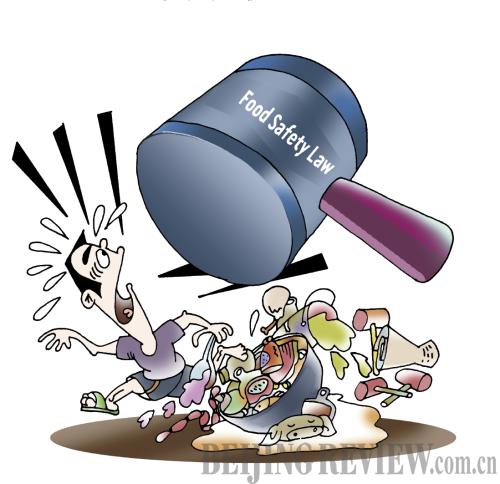|
 |
|
(CFP) |
With frequent food scandals including heavy-metal-laden rice, contaminated milk powder, vegetables with excessive pesticides and toxic chemical additives injected into food, anxiety about what you are putting into your body can sometimes dampen the enjoyment of even the finest food in China.
The issue forms something of a difficult situation for a country renowned for its rich culinary traditions, though a food-loving country such as China could never give up its high standards for dishes of the finest quality.
In its latest bid, China is turning to harsher legal punishments to help bring improvements.
During its bi-monthly session last month, the Standing Committee of the National People's Congress (NPC), China's top legislature, held its first reading of an amendment to the Food Safety Law. Generally, the enactment of a law or law amendment in China will go through at least three readings in the NPC or its Standing Committee, during which changes are made in response to feedback of lawmakers and the public.
A step forward
China started to phase in a legal framework for food safety issues in the early 1980s. In 1982, the experimental Food Hygiene Law was promulgated and paved the way for the present Food Safety Law.
At that time, the main concerns for food safety focused on food that was rotten, unsanitary or otherwise capable of causing poisoning, as well as food processing that introduced contaminants.
In 1995, the Food Hygiene Law was enacted and its scope expanded to other safety issues, such as food made with illegal chemical additives, as well as specific standards for food in hospitals and for infants.
In 2009, after three years of drafting, the Food Safety Law took effect. It consolidated hundreds of disparate regulations and standards in China into one unified food safety standard with the purpose of "establishing a powerful and effective legal system and increasing consumer confidence as well as pushing the development of the food industry while maintaining higher standards of quality."
But the situation has become worse in recent years. Weak penalties and slack regulation are cited as reasons for ineffective implementation of the law.
"The penalties for offenders are minor and the enforcement of the law is too lax, making the price of offending the law not high enough to stop breaches of the law," said Wu Jingming, a professor at China University of Political Science and Law in Beijing. "For consumers, the process of safeguarding their legal rights is time-consuming and few want to take the matter to court considering the little they get even if they win. More detailed regulations are needed to refer serious offenders to the criminal justice system."
Meanwhile, a number of shocking practices, including injecting clenbuterol into pork, recycling cooking oil, selling pork from sick pigs, making medicine capsules with toxic gelatin and passing rat and fox meat off as mutton and beef have made headlines in recent years. According to the Ministry of Public Security, police have investigated more than 52,000 food safety cases in the past three years.
Such instances have made the amendment of the Food Safety Law urgent. In late October 2013, the China Food and Drug Administration (CFDA) published a draft version of the latest amendment for public comment.
That draft increases the number of articles by 50 percent. It indicates that food manufacturers and distributors can expect stronger regulation of their internal operations and supply chains, and that local governments can expect that the Central Government will be more closely monitoring the way they enforce the law. Calls for companies and local governments to play more active, even aggressive, roles in solving food safety problems in China have been mounting for several years now.
| 